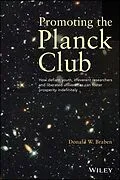Promoting the Planck Club presents rich mini histories of selected scientists whose work led to radical and transformational discoveries, their background, the prevailing scientific environment, and the conditions that allowed for their success. The text provides a broad audience of students, scientists, engineers, economists, and policymakers with ways to ensure that we take all steps to protect the flow of unpredictable scientific discoveries that are necessary for sustained levels of growth as well as ways to ensure that all steps are taken to protect the flow of unpredictable scientific discoveries.
Autorentext
DONALD W. BRABEN, PHD, is an honorary professor at University College London, a Fellow of the Institute of Physics, and Founder of Venture Research International Ltd. He spent some 16 years in particle physics, followed by spells in the Cabinet Office and Science Research Council headquarters before beginning his long association with Venture Research in 1980. Dr. Braben is the author of Scientific Freedom: The Elixir of Civilization and Pioneering Research: A Risk Worth Taking (both from Wiley).
Klappentext
I only hope that the people who presently control research funding are prepared to read this book, think carefully, and heed the advice.
Nobel Laureate Harry Kroto, The Florida State University
Don Braben's sobering book is right on the mark regarding the current disastrous path of funding of scientific research. . . . One can hope that Braben's model will be widely adoptedit could change the landscape of science in future decades.
US National Academy of Sciences member Harry L. Swinney, University of Texas at Austin
Promoting the Planck Club
How defiant youth, irreverent researchers and liberated universities can foster prosperity indefinitely
The twentieth century's plethora of creative scientists challenged the thinking of their day with uninhibited studies that led to such unpredicted technologies as lasers, countless electronic and telecommunications components, nuclear power, biotechnology, and medical diagnostic breakthroughs. While the potential of science is greater than ever, policies have changed over the past few decades. Proposals for new work must now be submitted to third parties for assessment of their national or societal benefits before they are considered for fundingmaking the possibility of securing financial backing increasingly difficult.
This provocative book traces the economic and social impact of frontier scientific research and focuses on the revolutionary discoveries that emerged from the unorthodox work of some of science's greatest pioneers. Clearly written and engaging from beginning to end, Promoting the Planck Club:
- Provides numerous mini histories of such selected scientists as Max Planck, Benjamin Thompson, Humphry Davy, Michael Faraday, Oswald Avery, Francis Crick, James Watson, Harry Kroto, Richard Smalley, Bob Curl, and more
- Explores the scientific environment that led to the important discoveries in the twentieth century and compares it with today's worrisome approach to the funding of scientific research
- Explains the consequences of current trends such as the industrialization of science and the corporatization of universities
- Stimulates discussion on the best atmosphere under which scientific research should be conducted
Recommended for general courses on science, Promoting the Planck Club: How defiant youth, irreverent researchers and liberated universities can foster prosperity indefinitely will appeal to scientists of various disciplines, engineers, economists, policy makers, and anyone interested in science, science policy, and the general nature of creativity.
Zusammenfassung
Promoting the Planck Club presents rich mini histories of selected scientists whose work led to radical and transformational discoveries, their background, the prevailing scientific environment, and the conditions that allowed for their success. The text provides a broad audience of students, scientists, engineers, economists, and policymakers with ways to ensure that we take all steps to protect the flow of unpredictable scientific discoveries that are necessary for sustained levels of growth as well as ways to ensure that all steps are taken to protect the flow of unpredictable scientific discoveries.
Inhalt
List of Posters ix
Foreword xi
Acknowledgments xv
Introduction 1
Chapter 1
Accidents, Coincidences, and the Luck of the Draw: How Benjamin Thompson and Humphry Davy Enabled Michael Faraday to Electrify the World 16
Chapter 2
Science, Technology, and Economic Growth: Can Their Magical Relationships Be Controlled? 27
Chapter 3
Max Planck: A Reluctant Revolutionary with a Hunger of the Soul 38
Chapter 4
The Golden Age of Physics 50
Chapter 5
Oswald T. Avery: A Modest Diminutive Introverted Scientific Heavyweight 79
Chapter 6
Barbara McClintock (19021992): A Patient, Integrating, Maverick Interpreter of Living Systems 89
Chapter 7
Charles Townes: A Meticulously Careful Scientific Adventurer 99
Chapter 8
Carl Woese: A Staunch Advocate for Classical Biology 110
Chapter 9
Peter Mitchell: A High-Minded Creative and Courageous Bioenergetics Accountant 126
Chapter 10
Harry Kroto: An Artistic and Adventurous Chemist with a Flair for Astrophysics 139
Chapter 11
John Mattick: A Prominent Critic of Dogma and a Pioneer of the Idea That Genomes Contain Hidden Sources of Regulation 158
Chapter 12
Conclusions: How We Can Foster Prosperity Indefinitely 174
Appendix 1
Open Letter to Research Councils UK from Donald W. Braben and Others Published in Times Higher
Education, November 5, 2009 194
Appendix 2
Global Warming: A Coherent Approach 197
References 201
Index 206
